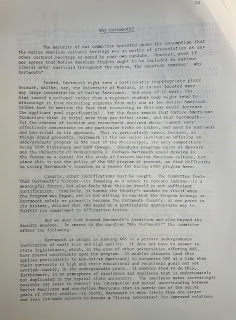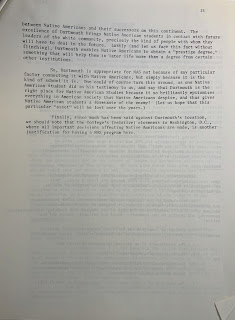 This year, the Native American Studies Program, or NAS, is celebrating 50 years of operation. To honor the Program, I am exploring its history as a Historical Accountability Student Research Fellow. I should preface this blog post by stating that the NAS is different from the Native American program, or NAP. The former is an academic discipline that would become an interdisciplinary “special program” at the College, whereas the latter is a non-academic support system for Native American students.
This year, the Native American Studies Program, or NAS, is celebrating 50 years of operation. To honor the Program, I am exploring its history as a Historical Accountability Student Research Fellow. I should preface this blog post by stating that the NAS is different from the Native American program, or NAP. The former is an academic discipline that would become an interdisciplinary “special program” at the College, whereas the latter is a non-academic support system for Native American students.One of the most important parts of the NAS Program was its approval process. First, the Ad hoc Committee on American Indian Studies released a report on NAS; this was the first recommendation for such a program. After the Ad hoc Committee on American Indian Studies. The Faculty of Arts and Sciences and President Kemeny, using the recommendations from the aforementioned committee, the Committee on Instruction and Executive Committee of the Faculty, formally approved NAS on May 8, 1972.
Along with the establishment of Native American Studies, the Faculty of Arts and Sciences also approved the following: “a written evaluation be made of the academic and budgetary status of the Program, by the Committee on Instruction and by an outside team (which includes Native American scholars) appointed by the COI, during the 1975-1976 academic year, [and] such evaluation to be shared with the Executive Committee of the Faculty.”
 In this blog post, I will be focusing on the written evaluation by the “outside team”, which came to be known as the Report of the Evaluation, released on March 12, 1975. In January 1975, the Evaluation Committee initially met with the goal of evaluating NAS to make a recommendation for the program. The Committee was united on all its conclusions except for the scope – regional or national – of the academic discipline. The Committee’s members included Dartmouth English Professor Peter A. Bien, Head of University of Manitoba’s Native Studies Dr. William Koolage, Dr. David Warren of the Institute of American Indian Arts, and Director of Native American Studies at the University of Montana Henrietta Whiteman.
In this blog post, I will be focusing on the written evaluation by the “outside team”, which came to be known as the Report of the Evaluation, released on March 12, 1975. In January 1975, the Evaluation Committee initially met with the goal of evaluating NAS to make a recommendation for the program. The Committee was united on all its conclusions except for the scope – regional or national – of the academic discipline. The Committee’s members included Dartmouth English Professor Peter A. Bien, Head of University of Manitoba’s Native Studies Dr. William Koolage, Dr. David Warren of the Institute of American Indian Arts, and Director of Native American Studies at the University of Montana Henrietta Whiteman. After the meetings in January, the group composed a thorough report with the following recommendations for NAS: 1) the Native American Studies continue for five more years 2) additional faculty should be hired, and the Chairman of NAS should oversee this process 3) core courses should be strengthened as additional faculty are hired 4) a language course must offered every school term. The Committee also requested that Chairman Michael Dorris be given released time for departmental consultations and meetings with the Native American community.
At this point, the interdisciplinary program is at its interim stage. When crafting the review, the Committee consulted President John G. Kemeny and the Dean of the Faculty.
 The report also included a passage on why NAS was adopted at Dartmouth. Eleazar Wheelock’s original promise and the faculty’s mandate are not enough justification for the continuation of NAS. One justification for the program is the development of young adults. According to the Committee, undergraduate students are extremely curious and “their educational and vocational goals [are] not yet settled [at their age].” A second justification is because of Dartmouth’s small class size, which achieves what cannot be done at a large size university. It fosters a mutual, intimate connection between Native American and non-Native students.
The report also included a passage on why NAS was adopted at Dartmouth. Eleazar Wheelock’s original promise and the faculty’s mandate are not enough justification for the continuation of NAS. One justification for the program is the development of young adults. According to the Committee, undergraduate students are extremely curious and “their educational and vocational goals [are] not yet settled [at their age].” A second justification is because of Dartmouth’s small class size, which achieves what cannot be done at a large size university. It fosters a mutual, intimate connection between Native American and non-Native students. I find this passage notable because the narrative surrounding the Native American Studies among the student body seems to focus on Kemeny’s re-commitment to the original charter and the recruitment of Native American students. While both elements impacted NAS, Dartmouth’s uniqueness – such as its relatively small size for a private research university – allows for this academic discipline to flourish.
Posted for Farah Lindsey-Almadani '25, recipient of the Dartmouth Library's Historical Accountability Student Research Fellowship for the 2022 Summer term. The Historical Accountability Student Research Program provides funding for Dartmouth students to conduct research with primary sources on a topic related to issues of inclusivity and diversity in the college's past. For more information, visit the program's website.
No comments :
Post a Comment